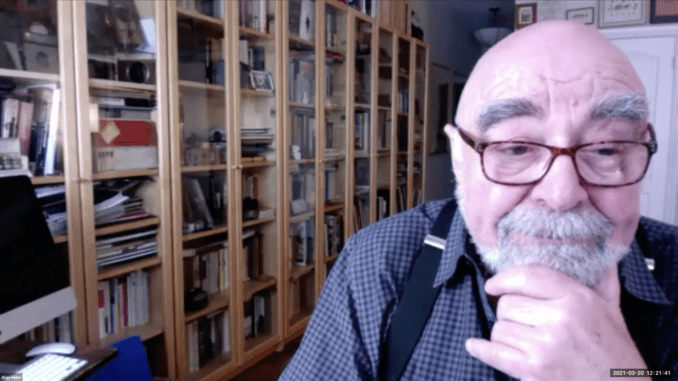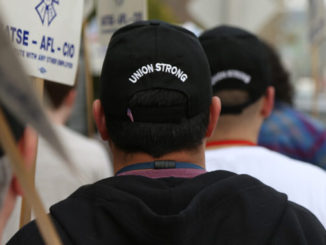
By Tricia Rodrigo
The Motion Picture Editors Guild capped a pandemic year with a General Membership meeting March 20, which covered everything from industrywide shutdowns to calls for racial justice to the upcoming IATSE Basic Agreement negotiations. Last year’s in-person meeting was hastily canceled as the Covid-19 pandemic began. This year’s virtual meeting, which lasted more than four hours, was attended by 266 members of the Guild and was overseen by President Alan Heim and Cathy Repola, National Executive Director.
For the past year, despite new challenges, the Union never stopped working to protect its members in the areas that mattered the most, by easing financial difficulties, extending healthcare coverage, and engaging in actions to combat racial justice. In the face of shelter-in-place orders, the guild was able to keep its members engaged through the over 180 virtual events that were offered.
Referring to the fact that the meeting took place on the first day of spring, Repola said: “It turned out to be a perfect day for us to be gathering because spring signifies new beginnings,” adding, “There’s certainly hope ahead in the foreseeable future, that we are going to get past this.” Repola paused to take a moment of silence to honor those who have been impacted by the coronavirus, including those who suffered the loss of loved ones due to Covid-19, as well to honor the victims of death and violence due to racism and discrimination.
Many members paid particularly close attention to the upcoming Basic Agreement talks, the first since the contentious negotiations in 2018 in which the Editors Guild, alone among IA locals, voted down the proposed contract.
With that three-year contract set to expire in July, Repola pointed to the “streamlined negotiations” that came about as a result of the widespread desire to focus on the most key issues in the wake of the pandemic. That means that there will be not be Local Negotiations this time around and each Guild instead will contribute big-picture priorities to the overall talks.
The four big-picture items that the Editors Guild has prioritized are: 1) Increasing and improving turnaround time from the details outlined in 2018, 2) improving conditions of the “new media” side letter, 3) including additional non-discrimination language into the Basic Agreement and the incorporation of diversity and inclusion training as a means to combat systemic racism, and 4) increasing the income into the MPI Plans.
Much discussion the past year has centered on systemic racism. As Repola said, “It has become an important issue to a lot of the Locals.” So the Guild is looking at that in addition to the potential for Diversity / Inclusion training.
Repola said that “a big piece of the negotiations is going to be centered on the MPI Plans.” The Union met expectations for the assumptions on hours being paid into the plans for 2020. The assumption was 80 million hours, and the actual mark was 79.4 million, due largely to Local 700 and Local 839, the Animation Guild, continuing to work to a large degree, despite on and off shutdowns during the pandemic last year.
Repola reminded the members that “there are only three sources of income that we have into the plans. One is investment income, and the hourly contributions made by the employers, and then there’s residuals.” Given the unpredictability of investment income, “we can only really only seek to increase the residuals or the hourly contribution rates,” said Repola. How much is money needed to secure the plans going forward will be dependent on projections from actuaries, which were not available at the time of the meeting.
Repola went over some preliminary estimates, but promised to continue engaging and informing the members once the finalized numbers come in. She promised to “hold more membership meetings, do some PowerPoints, do some podcasts, video recordings, whatever it is, to keep you informed of what’s going on … I feel strongly that the membership has a right to know about all this.”
For the past year, the MPEG Board of Directors has voted to offer relief to members hit by the pandemic by reducing quarterly dues by 50% and also covering 50% of the $58 quarterly per-capita fee paid to IATSE (the board has since reinstated the member responsibility for the per-capita starting with Q2 2021).
With many out-of-work members concerned about losing health coverage during the pandemic, MPI offered six months of continued health care through credited hours or premium-free COBRA to 439 Local 700 participants who would have otherwise lost their healthcare benefits.
In addition, recent federal law will allow participants on COBRA to continue to have COBRA-free premiums from April to September 2021. And in response to the continued calls for racial reform, the Union has begun a multiple phase effort to make a difference by holding diversity and inclusion training sessions for the staff, board of directors and diversity committee chairpersons, with an outside expert.
Other developments covered during the meeting:
- Rob Callahan, the Guild’s National Organizer, noted that Local 700 has been able to continue active organization efforts even during work-from-home conditions. Organizers secured a union contract for the Nickelodeon show “Unfiltered” after staging the very first strike from a crew that was working entirely from home. In addition, Titmouse Animation Studios are now entering contract negotiations for an agreement after the company agreed to recognize the Union when a majority of their editorial crew signed the voluntary recognition card.
- Members voted to uphold the charges and penalties brought by the Trial Body against Andrew P. Jones, a member found to have violated union rules during a production he worked on. As a result of the trial a one-year suspension and $5,000 fine were levied against Jones. After the membership vote, Jones vowed to keep fighting the charges.
- The EditorsGuild.com website has been updated to offer private forum discussions, an “available for work” list, enhanced member profiles, as well as more archives of virtual events the Guild has hosted.
Tricia Rodrigo is a Picture Editor with extensive credits in unscripted television.




